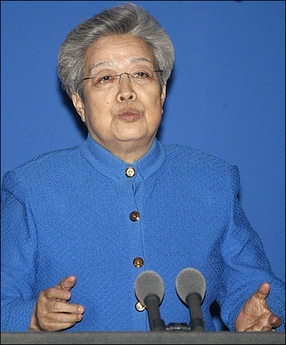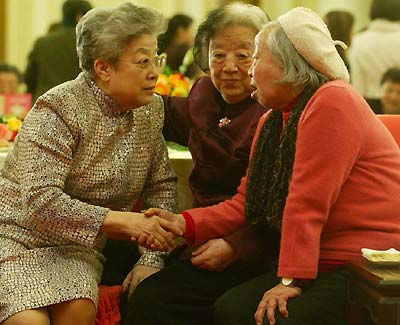
Wu Yi Biography and Photos
Wu Yi (traditional Chinese: 吳儀; simplified Chinese: 吴仪; pinyin: Wú Yí; born November 1938 in Wuhan, China) was one of four Vice Premiers of the State Council of the People's Republic of China, overseeing the country's economy until March 2008. Known as the "iron lady", Wu is one of the toughest negotiators in China's government, Forbes magazine considered her the second most powerful woman in the world in 2004, 2005 and 2007.

In April 1962, she joined the Communist Party of China. In August of the same year, she graduated from the Petroleum Refinery department at the Beijing Petroleum Institute, with a degree in petroleum engineering. She spent much of her career as a petroleum technician, eventually becoming deputy manager at the Beijing Dongfang Hong refinery, and assistant manager and party secretary at the Beijing Yanshan Petrochemical Corporation.
She was elected deputy mayor of Beijing in 1988, and held that office until 1991. Following the Tiananmen Square protests of 1989, she persuaded coal workers threatening to go on strike to continue working after some of their colleagues had been killed. From 1991 until 1998, she held successively the posts of Deputy Minister of Foreign Economic Relations and Trade, Minister of Foreign Trade and Economic Co-operation, and member of the Fourteenth and Fifteenth Central Committee of the Communist Party of China. A protege of Zhu Rongji, she became a state councillor in 1998, and was appointed Vice Premier of the State Council in March 2003. She was the first woman to hold the position since economic and political reforms in 1978, and the most powerful woman in Chinese politics since Jiang Qing. She helped negotiate the PRC's entry into the World Trade Organization and reorganised the customs service after U.S. complaints over the widespread violation of intellectual property rights.
She was elected deputy mayor of Beijing in 1988, and held that office until 1991. Following the Tiananmen Square protests of 1989, she persuaded coal workers threatening to go on strike to continue working after some of their colleagues had been killed. From 1991 until 1998, she held successively the posts of Deputy Minister of Foreign Economic Relations and Trade, Minister of Foreign Trade and Economic Co-operation, and member of the Fourteenth and Fifteenth Central Committee of the Communist Party of China. A protege of Zhu Rongji, she became a state councillor in 1998, and was appointed Vice Premier of the State Council in March 2003. She was the first woman to hold the position since economic and political reforms in 1978, and the most powerful woman in Chinese politics since Jiang Qing. She helped negotiate the PRC's entry into the World Trade Organization and reorganised the customs service after U.S. complaints over the widespread violation of intellectual property rights.

During the SARS crisis, she replaced Zhang Wenkang, who had been fired for his coverup of the crisis, as health minister and headed a committee to solve the crisis. She was called the "Goddess of Transparency" by Time magazine for her leadership during the SARS crisis and named one of Time's 100 Most Influential People of 2004. In the middle of the SARS endemic, Wu fiercely snubbed the advocation for Republic of China's WHO participation during the WHO general assembly. One video clip aired widely in Taiwan showed Wu rebuffing the question of Taiwan's representation during interview by a Taiwanese reporter.
Called by Chinese media as the "Iron Lady of China", Wu is regarded as a firm and direct woman who, unlike her colleagues, has not dyed her graying hair black. Since becoming Vice Premier, Wu has been an able diplomat in signing agreements with neighboring Asian countries. She also makes frequent inspection visits to many southern Chinese regions. Since the death of Huang Ju, the senior Vice Premier, Wu has taken on the portfolio of overseeing financial work.
Called by Chinese media as the "Iron Lady of China", Wu is regarded as a firm and direct woman who, unlike her colleagues, has not dyed her graying hair black. Since becoming Vice Premier, Wu has been an able diplomat in signing agreements with neighboring Asian countries. She also makes frequent inspection visits to many southern Chinese regions. Since the death of Huang Ju, the senior Vice Premier, Wu has taken on the portfolio of overseeing financial work.









No comments:
Post a Comment
Dear Visitor,
Please feel free to give your comment. Which picture is the best?
Thanks for your comment.